“Take My Yoke upon You, and Learn of Me”
Matthew 11:28–30; 12:1–13; Luke 7:36–50; 13:10–17
LDS manual: here
Purpose
To instill readers with a sense of gratitude that they no longer have to engage in time-wasting and self-destructive shenanigans, such as those offered by the church.
Reading
In this lesson, Jesus is still in the Galilean phase of his ministry. He’s cruising around, doing miracles, and picking fights with rival religionists. He seems to have outgrown his discipleship with John the Baptist, realising that he’s quite popular in his own right. And when John gets thrown into prison, Jesus realises it’s time for him to step up and take over John’s racket.
John’s not too sure about this. From prison, he sends two of his disciples to Jesus to check him out.
Matthew 11:2 Now when John had heard in the prison the works of Christ, he sent two of his disciples,
11:3 And said unto him, Art thou he that should come, or do we look for another?
It’s a bit odd that John seems uncertain about Jesus. He was supposedly present for the baptism and the dove and the voice from heaven, so you think he’d have made his mind up somehow… oops, unless those things were later insertions like so much of the New Testament.
Not much else to say about John, except that Jesus says some nice things about him.
Matthew 11:11 Verily I say unto you, Among them that are born of women there hath not risen a greater than John the Baptist: notwithstanding he that is least in the kingdom of heaven is greater than he.
You think Jesus / Jehovah mellowed out and got nice after getting a body? Nope. Here, Jesus condemns several cities, Old-Testament style, because they didn’t believe in him enough:
Matthew 11:20 Then began he to upbraid the cities wherein most of his mighty works were done, because they repented not:
11:21 Woe unto thee, Chorazin! woe unto thee, Bethsaida! for if the mighty works, which were done in you, had been done in Tyre and Sidon, they would have repented long ago in sackcloth and ashes.
11:22 But I say unto you, It shall be more tolerable for Tyre and Sidon at the day of judgment, than for you.
11:23 And thou, Capernaum, which art exalted unto heaven, shalt be brought down to hell: for if the mighty works, which have been done in thee, had been done in Sodom, it would have remained until this day.
11:24 But I say unto you, That it shall be more tolerable for the land of Sodom in the day of judgment, than for thee.
Main ideas for this lesson
The Sabbath
Then there’s some pointless wrangling about the Sabbath.
I would indeed be ungrateful if I did not take of a moment and say that not obeying the Sabbath is teh best. It’s fantastic not taking up your time with tedious meetings or sitting in Sunday School. You get an entire extra day! It’s like doubling your weekend.
And somehow, even though the consequences of Sabbath-breaking are supposed to be so dire, they ultimately fail to eventuate.
And what was I doing last Sunday? I’m glad you asked. I was helping to break the world record for biggest skinny dip! Nearly 800 people here in Perth smashed the record, and I talked about it on the radio.
Going to the beach, meeting up with great people, and going swimming in the buff was so much better than going to church. It was infinity times better. There’s no comparison. Being an ex-Mormon opens up a new world of possibilities.
The yoke of Mormonism
Jesus, by contrast, invites us to put on one of these things.
Matthew 11:29 Take my yoke upon you, and learn of me; for I am meek and lowly in heart: and ye shall find rest unto your souls.
11:30 For my yoke is easy, and my burden is light.
Looks fun, doesn’t it? Usually, yokes are for beasts of burden, but Jesus says you can wear one, too. It looks entirely necessary, and not like something intended to suck the enjoyment out of your life. And Jesus even says how easy it is, so how does that not sound great.
Object lesson for class: Bring a yoke to class. Ask for a pair of volunteers to stick their necks in it.
Ask: If someone suggested that you wear a farm implement like this so you could do his work for him, what would you say? (Invite responses.)
I know, I know: members will say, “The world claims to offer us fun that is ultimately unfulfilling. Taking on the yoke of Christ may seem like a bad deal, but discipleship is much better.”
Having done both, I can tell you it’s just the opposite. The church wants to absorb your life in a series of time-wasting activities that serve only to advance its own aims at your expense. Being able to direct your own life without superstition is not the same as amoral hedonism. Many people, once they take the yoke off their backs, learn to make better decisions with better information, and as a result live better and more fulfilling lives. (And a few people are total disasters. But frightening people into obedience does not give you a better person.)
Ask: What kinds of responsibilities do church members routinely accept?
Possible answers: Church meetings, leadership positions, missions, callings, home and visiting teaching, temple attendance, zzzzzzz…
And now there’s cleaning the church buildings. After I left the church, I was astounded to hear that they’d laid off their professional janitors and custodians, and were inducing members to clean the buildings! This accomplishes three goals simultaneously:
- establishes dominance over members,
- cashes in on free labour, and
- gets ward meetinghouses to smell faintly of wee.
Watch this inspiring video about how great it is to clean the toilets of a church that you’re already paying 10% toward.
Ask: What could possibly make someone accept such a wide and unnecessary set of burdens and constraints?
One possible answer is the investment fallacy, as discussed in this lesson. People born in the church become used to spending a great deal of time supporting it — see these commitment cards aimed at kids, as one rank example — and converts are treated to an ever-escalating set of commitments. When someone spends a great deal of time on a system, it becomes harder and harder to unplug from it, since doing so would be an admission that they’re wasted their time, and no one likes to admit that they’ve wasted their time.
Philosopher Daniel Dennett gave a TED talk called “Dangerous Memes” that explains this.
Watch the video describing a bizarre behaviour that ants engage in when their brains are infected by a virus.
Partial transcript:
So you’re out in the woods, or you’re out in the pasture, and you see this ant crawling up this blade of grass. It climbs up to the top, and it falls, and it climbs, and it falls, and it climbs — trying to stay at the very top of the blade of grass. What is this ant doing? What is this in aid of? What goals is this ant trying to achieve by climbing this blade of grass? What’s in it for the ant? And the answer is: nothing. There’s nothing in it for the ant. Well then, why is it doing this? Is it just a fluke? Yeah, it’s just a fluke. It’s a lancet fluke. It’s a little brain worm. It’s a parasitic brain worm that has to get into the stomach of a sheep or a cow in order to continue its life cycle. Salmon swim upstream to get to their spawning grounds, and lancet flukes commandeer a passing ant, crawl into its brain, and drive it up a blade of grass like an all-terrain vehicle. So there’s nothing in it for the ant. The ant’s brain has been hijacked by a parasite that infects the brain, inducing suicidal behavior. Pretty scary.
Well, does anything like that happen with human beings? This is all on behalf of a cause other than one’s own genetic fitness, of course. Well, it may already have occurred to you that Islam means “surrender,” or “submission of self-interest to the will of Allah.” Well, it’s ideas — not worms — that hijack our brains.
…
Hosts work hard to spread these ideas to others.
Ask: Why do these ants work so hard in a behaviour that is of no benefit to them, but of immense benefit to the brain virus that has infected them?
Ask: If one such ant could talk, and you asked it why it was climbing that blade of grass, what explanation do you think it might offer for its behaviour?
Possible answer: It might say that it was doing so of its own free will.
Ask: What behaviours do you see Latter-day Saints engaging in that serve to benefit the church, and not themselves?
Possible answers: Missionary work, apologetics, offering their time, talents, and all that they have to the “building up of Zion”.
In addition to these burdens, the church offers some artificial ones. We yoke ourselves with artificial guilt, even when we do normal things or have normal desires.
A lot of the friction between my parents and me was caused by me not doing or saying or thinking the things they thought I should, in order to be a good Latter-day Saint. My enjoyment of popular music worried them horribly, and it shouldn’t have. They worried about what I read, who I knew, what I watched. The church caused a lot of unnecessary conflict in our relationship.
For me now, I can help my sons by appealing to rational reasons to avoid real trouble (drugs, crime, and so on), while realising that there are many ways to live, and I don’t have all the answers. Rather than imagining that they’ll do well if they follow in my footsteps, I can encourage them to grow in ways I didn’t predict — to find things out about our world and our society, and then come back and tell me about them.
And then there’s a post-deconversion aspect: The artificial concept of the afterlife means that our family members are concerned for our “eternal souls”. I have to tell you: I ain’t got one. None of us do. I’m sure that my dear sister is overly anxious for me to return to the church so I don’t suffer an eternity of isolation, inflicted on me by a cruel and sadistic god. Sadly, she’s spending time in her limited life fretting about my non-existent soul, as we both hurry to the grave. This is unnecessary suffering caused directly by her religious beliefs.
As a missionary, one of the toughest audiences I had was a trio of LDS girls who were sisters. We were giving the family a member presentation about the blessings of church involvement, and it was clear that these girls were fucking done. They’d had a lifetime of it, and they tried to explain that the “blessings” were few and the constraints were many. As a fellow lifelong constrainee, I tried to drum up some enthusiasm, but they weren’t having it. Their answers were monosyllabic and flat.
I wonder what happened to those girls. I hope they managed to escape and be happy, instead of spending a lifetime in the empty church, waiting for a better life to begin. We all have the opportunity to throw off the yoke, and begin a new secular life without gods. Our individual circumstances differ. Some of us feel the need to go along with the church to make peace in our personal relationships, but this freedom is still possible, if not in our behaviour, in our minds.
Additional teaching ideas
Sin against the Holy Ghost
What are the worst sins in the world? In the Book of Mormon, having sex is called the sin next to murder, so sex and murder are likely up the top of the list.
But Jesus teaches that even worse than murder (for which, after all, there may be forgiveness under certain circumstances) is the sin against the Holy Ghost.
Matthew 12:31 Wherefore I say unto you, All manner of sin and blasphemy shall be forgiven unto men: but the blasphemy against the Holy Ghost shall not be forgiven unto men.
12:32 And whosoever speaketh a word against the Son of man, it shall be forgiven him: but whosoever speaketh against the Holy Ghost, it shall not be forgiven him, neither in this world, neither in the world to come.
Here’s the entry for “unpardonable sin” in the Encyclopedia of Mormonism:
The gravest of all sins is blasphemy against the Holy Ghost. One may speak even against Jesus Christ in ignorance and, upon repentance, be forgiven, but knowingly to sin against the Holy Ghost by denying its influence after having received it is unpardonable (Matt. 12:31-32; Jacob 7:19; Alma 39:6), and the consequences are inescapable. Such denial dooms the perpetrator to the hell of the second spiritual death (TPJS, p. 361). This extreme judgment comes because the person sins knowingly against the light, thereby severing himself from the redeeming grace of Christ. He is numbered with the sons of perdition (D&C 76:43).
It may seem strange — to a normal person — that a crime of unbelief would be more serious than murdering someone, but in a religious context, this makes perfect sense. Unbelief is what kills gods, and so it’s natural for a robust and healthy god-meme to develop an immune system to protect itself. Otherwise, deicide is on the menu.
What’s even stranger is that, as dangerous as this sin would appear to be, there’s very little specificity on just what constitutes the commission of it. I recall a belief in the church that it was well-nigh impossible to commit for a garden-variety member. Aside from that, opinions seem to vary widely on what you have to say or do to merit Outer Darkness. What do you have to do? Trash-talk the Spirit? Kill an innocent person? Find Jesus and crucify him again? It’s not clear. And — what can I say — this resembles what happens when a despotic system levies severe punishments for crimes, but doesn’t make public what the crimes are.
So let me take the opportunity to do the worst thing EVAR. Most of my LDS sources say that you have to know the HG before you can deny it. Well, I’ve felt what I once thought to be the influence of Holy the Ghost, but which I now think was a psychological effect that is easily reproducible across world religions. So let me say this:
I deny the Holy Ghost.
I deny that I was ever under the influence of any such ghost, as ghosts are non-existent figments of human imagination and wonky pattern recognition. Any such influence can be more easily explained as a desire to believe, and as social pressure to uphold the norms and beliefs of a group.
I say essentially the same thing in a recent promo for my language podcast. Listen:
Your browser does not support this audio
Also, I approve of this cartoon showing a Godhead threesome. Suck it, ghost.
Some Mormons might say that in writing and saying the above, I haven’t actually denied the Holy Ghost or committed the Great Unpardonable. Perhaps they’d say I don’t have the requisite knowledge, or the Unpardonable Sin requires me to murder someone, or crucify Jesus again, or some such nonsense. My response would be that I’ve denied the Holy Ghost as much as I can, and if anyone has any ideas for how I can deny the Holy Ghost more completely, please send them in and I can do them, perhaps in a YouTube video.
But not if they involve killing anyone. I don’t want to kill anyone because I’m actually a good person, and it’s the rules of Christianity and Mormonism that are twisted.























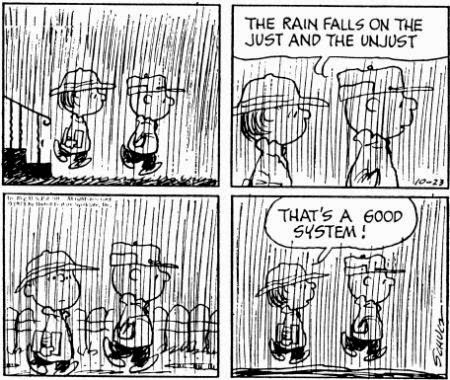




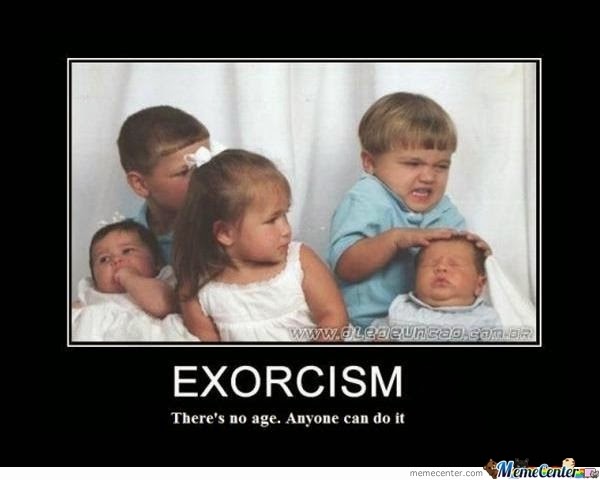

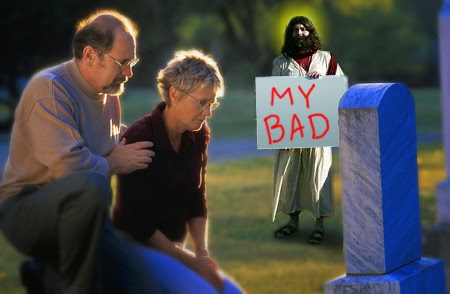
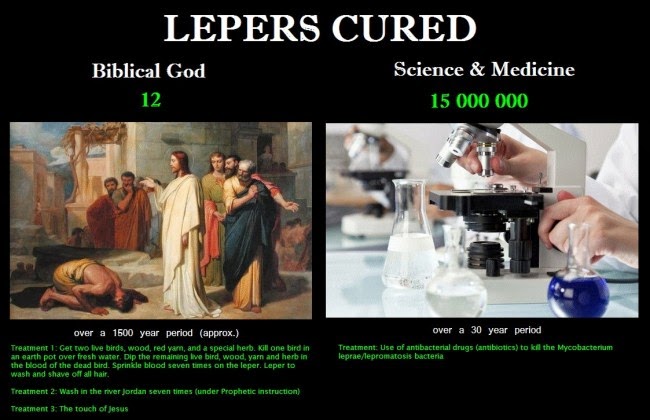








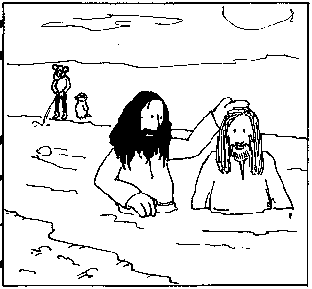









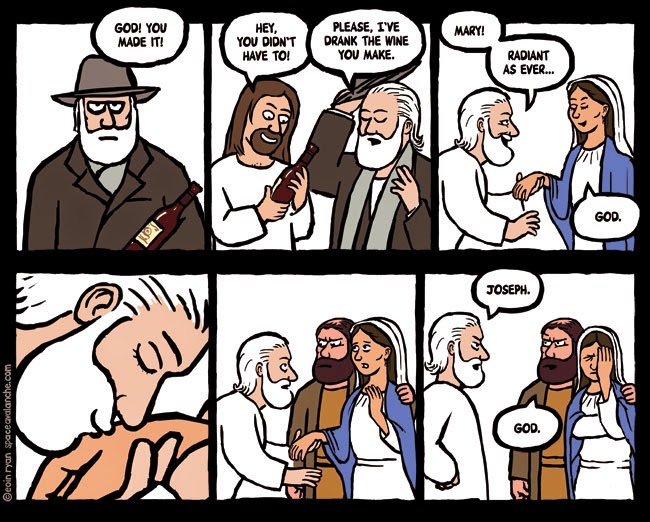







Recent Comments